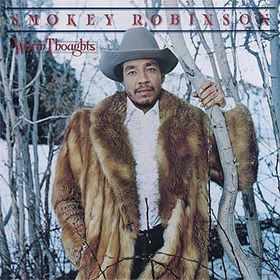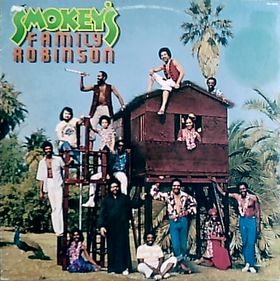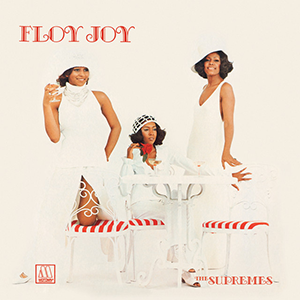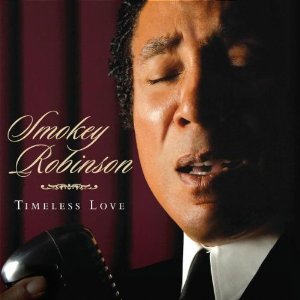
The Miracles Doin' Mickey's Monkey is an album by The Miracles, released in 1963 by Tamla Records. It includes the group's Top 10 smash single "Mickey's Monkey", written and produced by Holland-Dozier-Holland, which was later recorded by several other artists. "Mickey's Monkey" popularized "The Monkey" as a novelty dance. Also included is another H-D-H dance-oriented single, "I Gotta Dance to Keep From Crying", a Billboard Top 40 hit. The album peaked at No. 113 on the Billboard 200.

Warm Thoughts is an album by the American musician Smokey Robinson, released in 1980. It features the top 40 hit, "Let Me Be the Clock". The album was arranged by Reginald "Sonny" Burke. This album also featured the semi-autobiographical tune "Wine, Women and Song", which proved to be the closest thing to a Miracles reunion that occurred in the 1980s, with Smokey doing a duet with his then-wife, former Miracle Claudette Robinson, and Miracle Marv Tarplin, with whom he shared songwriting credits, on guitar. The song "Travelin' Thru'" was written by Smokey's real-life sister, Rose Ella Jones, and two songs written by Robinson with fellow Motown artist, Stevie Wonder, and singer, songwriter, and former Starsky and Hutch star, David Soul. This album was a success, reaching the Top 20 of The Billboard 200 Pop Album chart, peaking at No. 14, and the Top 10 of Billboard's R&B Album Chart, peaking at No. 4.

A Quiet Storm is the 1975 third solo album by American soul singer, songwriter, and producer Smokey Robinson. The album received generally positive reviews, and spawned the hit single "Baby That's Backatcha", which spent one week at the top of the Billboard Hot Soul Singles chart.
Joy of Cooking was an American music ensemble formed in 1967, in Berkeley, California. Identified with the hippie culture, the band's music melded rock & roll with folk, blues, and jazz. The band released three studio albums on Capitol Records in the early 1970s as well as a minor hit single in 1971, "Brownsville". Led by guitarist Terry Garthwaite and pianist Toni Brown, who shared lead vocals, Joy of Cooking was an unusual example of a rock band fronted by women.

Pure Smokey is Smokey Robinson's second post-Miracles album, released in 1974. It features the single "Virgin Man." Several songs were written by Robinson with fellow Miracle Marv Tarplin, who left the group a year after Robinson's departure to join him in California and assist him in his solo projects.

Smokey's Family Robinson is an album by Smokey Robinson, released in 1976. The title is a pun on The Swiss Family Robinson.

Deep in My Soul is Smokey Robinson's fifth solo album. It was released in 1977.

Love Breeze is an album by the American musician Smokey Robinson, released in 1978. It was arranged by Sonny Burke. It peaked at No. 75 on the Billboard 200.

Smokin' is a Smokey Robinson live album released in 1978.

Where There's Smoke... is a 1979 album by Smokey Robinson, released on Motown Records' Tamla label. It contains his Billboard Top ten pop hit single "Cruisin'".

Floy Joy is the twenty-fifth studio album released by The Supremes on the Motown label. This was the only Supremes album solely produced and arranged by Smokey Robinson and included the U.S. top 20 hit, "Floy Joy" and the U.S. top 40 hit, "Automatically Sunshine", both of which were top 10 hits in the U.K.

Greatest Hits, Vol. 2 is the second greatest hits album for The Miracles, released in 1968 on Motown Records' Tamla label. It contained the most popular singles from the successful Going to a Go-Go, Away We A Go-Go and Make It Happen albums of the 1965–1967 period. It also featured the 1964 non-album single "Come On Do The Jerk", and two B-sides, "Choosey Beggar" and "Save Me". The hit single "I Second That Emotion" was new to the album. This album reached the Top 10 on the Billboard 200 albums chart, peaking at #7, and peaked at #2 on Billboard's R&B album chart. Ten of the albums' 12 songs were written by Miracles members Smokey Robinson, Pete Moore, Marv Tarplin, Bobby Rogers, and Ronnie White.

1957–1972 is a 1972 double album by The Miracles on Motown Records' Tamla label. This two-record set is noted as the group's final series of live concerts with original lead singer Smokey Robinson, recorded over a period of three days, July 14–16, during the 1972 National Parks Centennial, at the Carter Barron Amphitheater in Washington, D.C., and charted at No. 75 on the Billboard Top 200 Album chart, and at No. 14 on its R&B Album chart. During the show, Smokey's wife, original Miracles member Claudette Rogers Robinson, who stopped touring with the group in 1964, reunited with the Miracles on stage for the first time in eight years. As a celebration of the group's fifteen years together, The Miracles made this an "all request" show, where audience members could choose which of the group's long string of hits they wanted performed. Also, at the end of the concert, Miracles fans were introduced to the group's new lead singer, Billy Griffin. According to Smokey's autobiography, Smokey: Inside My Life, The Miracles' final concert was videotaped in movie form, but was never publicly released. However, 1957–1972 was released on CD originally in 1990, and re-released again in 2004 along with The Miracles' 1969 "Live" album in the 2004 Motown/Hip-O Select release Smokey Robinson and The Miracles: The Live Collection.

Flying High Together is an album by Smokey Robinson and the Miracles on Motown Records' Tamla label, released in 1972. It is noted as The Miracles' last studio album with original lead singer Smokey Robinson, who retired from the act to concentrate on his duties as vice president of Motown. The album charted at #46 on the Billboard Pop Album chart, and featured two singles: the appropriately named "We've Come Too Far to End It Now", which matched the parent album's chart position on the Billboard singles chart, charting at #46, and reached the Top 10 of the Billboard R&B singles chart, charting at #9, and "I Can't Stand to See You Cry", which charted at #45 Pop, and #21 R&B.

What Love Has...Joined Together is a 1970 album by R&B group Smokey Robinson & The Miracles on Motown Records' Tamla label. A concept album consisting solely of six short love songs, it charted at number 97 on the Billboard Top 200 Album chart, and reached the Top 10 of Billboard's R&B album chart, peaking at number 9. It was the first Miracles album to have no new songs; the recordings are all cover versions of songs written by noted composers, such as Stevie Wonder, Berry Gordy, Frank Wilson, Brenda Holloway and her sister Patrice Holloway, Burt Bacharach and Hal David, Marvin Gaye, The Beatles' John Lennon & Paul McCartney,, and Miracles members Smokey Robinson and Bobby Rogers.

Timeless Love is a studio album of standards by Smokey Robinson, released through New Door Records in 2006. It reached No. 109 on the Billboard album chart. In 2007, the album was nominated for but did not win a Grammy Award for Best Traditional Pop Vocal Album.

Touch the Sky is a 1983 album by American singer Smokey Robinson. It was produced and arranged by Robinson with Reginald "Sonny" Burke, and recorded and mixed at Golden Sound Studios, Inc., Hollywood, California. The album was released on the Motown sub-label Tamla.

Essar is a 1984 album by American singer Smokey Robinson. It was produced and arranged by Robinson with Reginald "Sonny" Burke. The album was released on the Motown sub-label Tamla. The album's title is a pun on the initials of Robinson's name (S.R.).

Double Good Everything is an album by the American musician Smokey Robinson, released in 1991. It was his first album to be released by a label other than Motown.

Turn You to Love is a studio album from American musician Terry Callier. Released by Elektra Records in 1979, this is the artist's sixth album and the second with Elektra. It has received mixed critical reception.



















